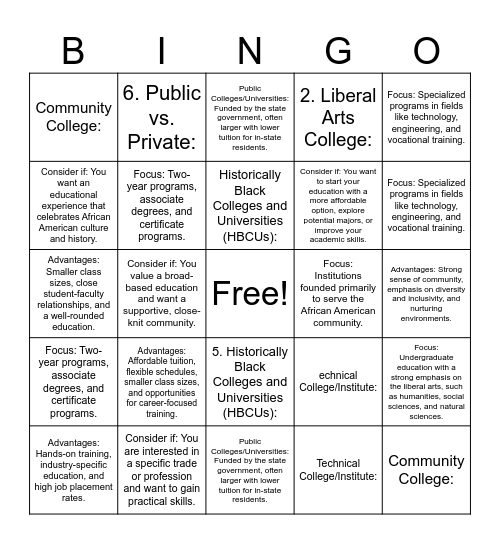

This bingo card has a free space and 42 words: Community College:, Focus: Two-year programs, associate degrees, and certificate programs., Advantages: Affordable tuition, flexible schedules, smaller class sizes, and opportunities for career-focused training., Consider if: You want to start your education with a more affordable option, explore potential majors, or improve your academic skills., Community College:, Focus: Two-year programs, associate degrees, and certificate programs., Advantages: Affordable tuition, flexible schedules, smaller class sizes, and opportunities for career-focused training., Consider if: You want to start your education with a more affordable option, explore potential majors, or improve your academic skills., 2. Liberal Arts College:, Focus: Undergraduate education with a strong emphasis on the liberal arts, such as humanities, social sciences, and natural sciences., Advantages: Smaller class sizes, close student-faculty relationships, and a well-rounded education., Consider if: You value a broad-based education and want a supportive, close-knit community., echnical College/Institute:, Focus: Specialized programs in fields like technology, engineering, and vocational training., Advantages: Hands-on training, industry-specific education, and high job placement rates., Consider if: You are interested in a specific trade or profession and want to gain practical skills., 5. Historically Black Colleges and Universities (HBCUs):, Focus: Institutions founded primarily to serve the African American community., Advantages: Strong sense of community, emphasis on diversity and inclusivity, and nurturing environments., Consider if: You want an educational experience that celebrates African American culture and history., 6. Public vs. Private:, Public Colleges/Universities: Funded by the state government, often larger with lower tuition for in-state residents., Private Colleges/Universities: Operated independently, typically smaller with potentially higher tuition but also more financial aid opportunities., Community College:, Two-year programs, associate degrees, and certificate programs., Advantages: Affordable tuition, flexible schedules, smaller class sizes, and opportunities for career-focused training., Consider if: You want to start your education with a more affordable option, explore potential majors, or improve your academic skills., Liberal Arts College:, Focus: Undergraduate education with a strong emphasis on the liberal arts, such as humanities, social sciences, and natural sciences., Advantages: Smaller class sizes, close student-faculty relationships, and a well-rounded education., Consider if: You value a broad-based education and want a supportive, close-knit community., Technical College/Institute:, Focus: Specialized programs in fields like technology, engineering, and vocational training., Advantages: Hands-on training, industry-specific education, and high job placement rates., Consider if: You are interested in a specific trade or profession and want to gain practical skills., Historically Black Colleges and Universities (HBCUs):, Focus: Institutions founded primarily to serve the African American community., Advantages: Strong sense of community, emphasis on diversity and inclusivity, and nurturing environments., Consider if: You want an educational experience that celebrates African American culture and history., Public vs. Private:, Public Colleges/Universities: Funded by the state government, often larger with lower tuition for in-state residents. and Private Colleges/Universities: Operated independently, typically smaller with potentially higher tuition but also more financial aid opportunities..
⚠ This card has duplicate items: Community College: (3), Focus: Two-year programs, associate degrees, and certificate programs. (2), Advantages: Affordable tuition, flexible schedules, smaller class sizes, and opportunities for career-focused training. (3), Consider if: You want to start your education with a more affordable option, explore potential majors, or improve your academic skills. (3), Focus: Undergraduate education with a strong emphasis on the liberal arts, such as humanities, social sciences, and natural sciences. (2), Advantages: Smaller class sizes, close student-faculty relationships, and a well-rounded education. (2), Consider if: You value a broad-based education and want a supportive, close-knit community. (2), Focus: Specialized programs in fields like technology, engineering, and vocational training. (2), Advantages: Hands-on training, industry-specific education, and high job placement rates. (2), Consider if: You are interested in a specific trade or profession and want to gain practical skills. (2), Focus: Institutions founded primarily to serve the African American community. (2), Advantages: Strong sense of community, emphasis on diversity and inclusivity, and nurturing environments. (2), Consider if: You want an educational experience that celebrates African American culture and history. (2), Public Colleges/Universities: Funded by the state government, often larger with lower tuition for in-state residents. (2), Private Colleges/Universities: Operated independently, typically smaller with potentially higher tuition but also more financial aid opportunities. (2)
Quincy Teen REACH College Day BINGO | Quincy Teen REACH College Day BINGO | College Day BINGO | College Day BINGO | Quincy Teen REACH College Day BINGO
Share this URL with your players:
For more control of your online game, create a clone of this card first.
Learn how to conduct a bingo game.
With players vying for a you'll have to call about __ items before someone wins. There's a __% chance that a lucky player would win after calling __ items.
Tip: If you want your game to last longer (on average), add more unique words/images to it.